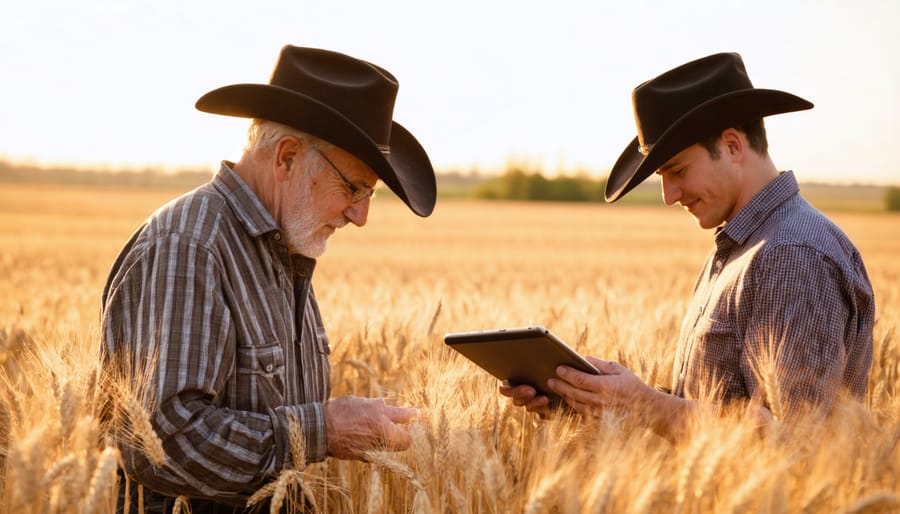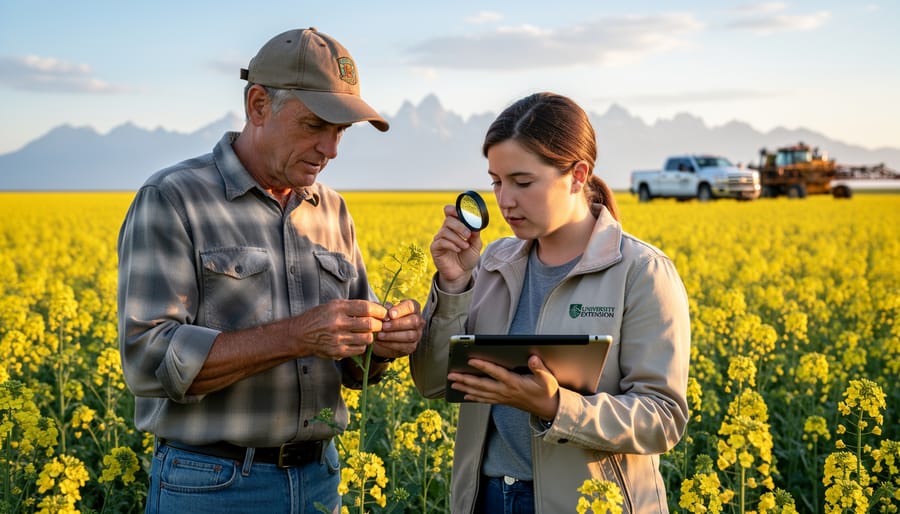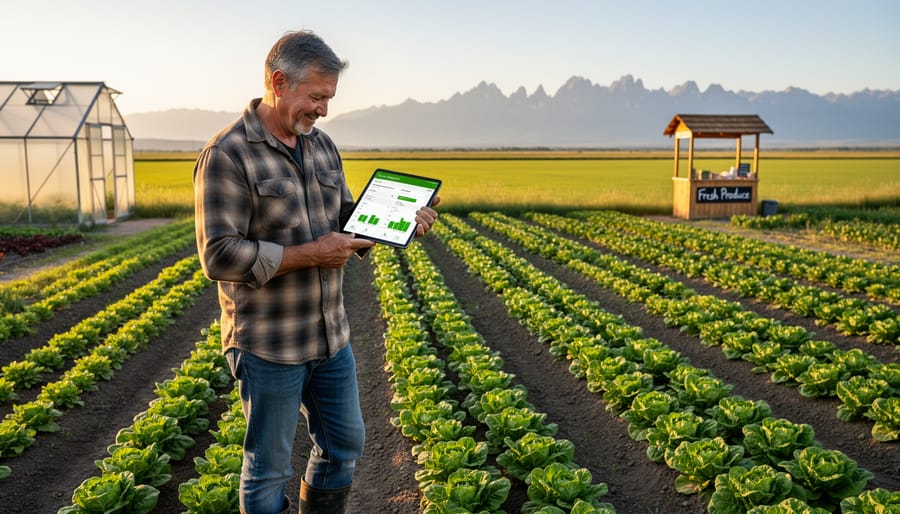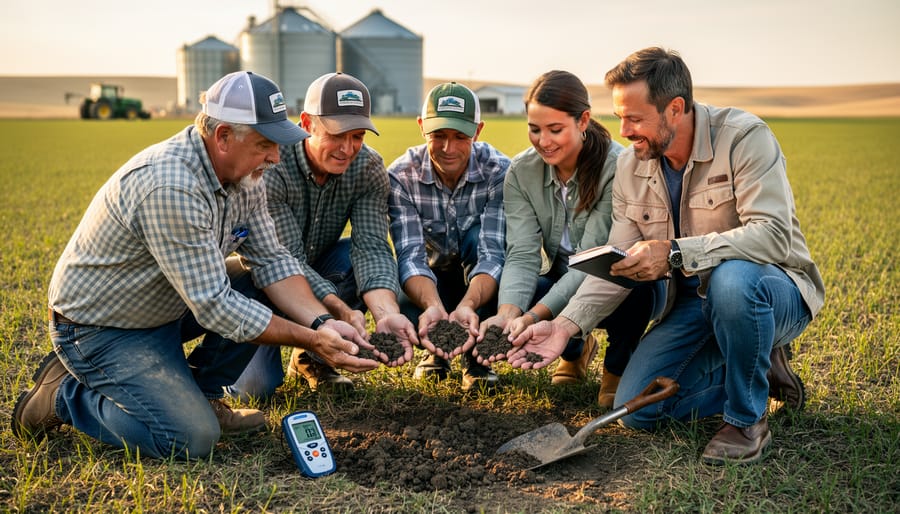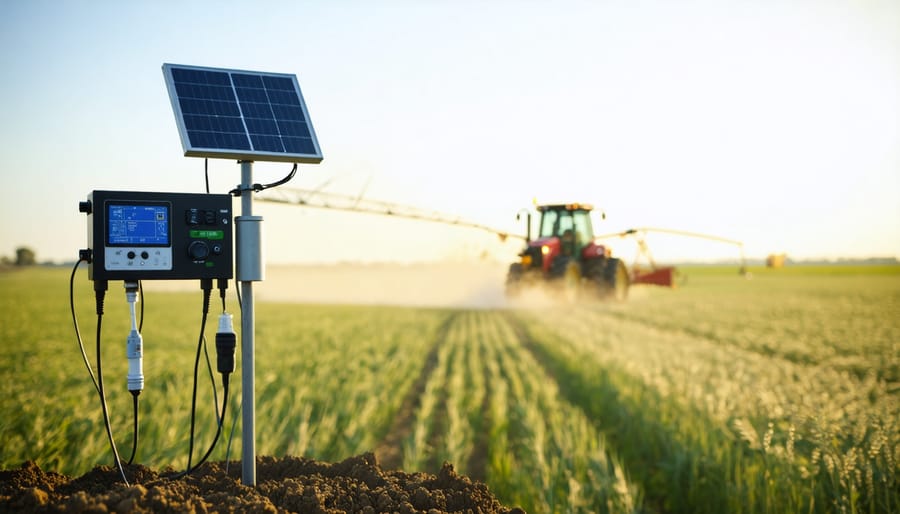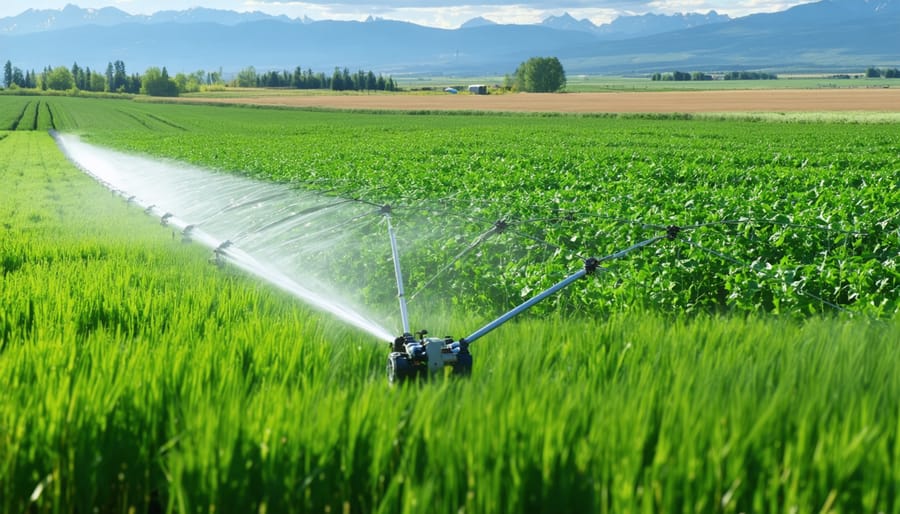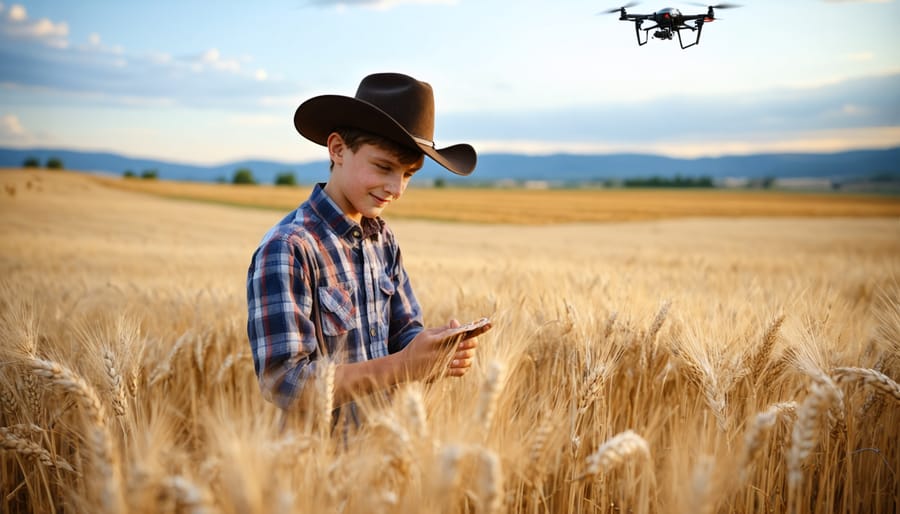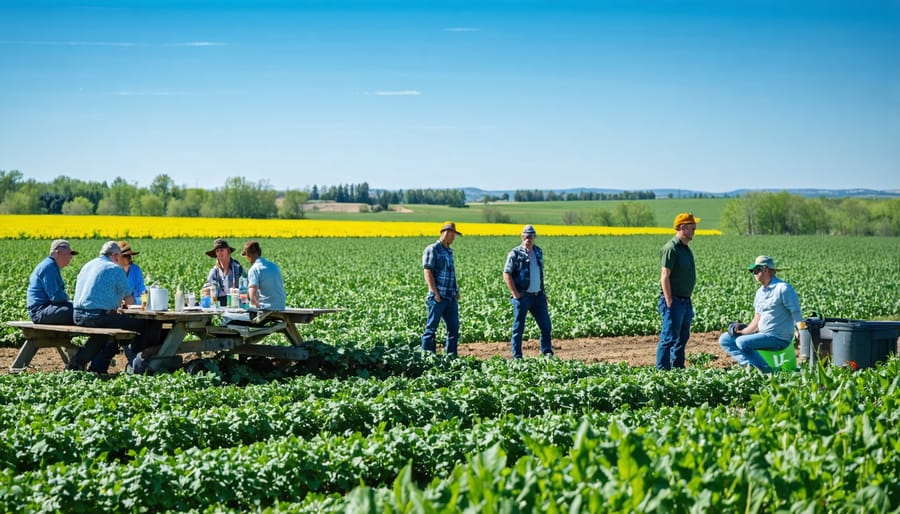Bridging generations of agricultural wisdom stands as one of the most crucial challenges facing Canadian farming today. As experienced farmers approach retirement, their decades of regional knowledge – from understanding local soil conditions to predicting weather patterns in Alberta’s diverse landscape – risk being lost without structured knowledge transfer systems. Intergenerational training programs create deliberate pathways for seasoned farmers to share their expertise with the next generation, while simultaneously incorporating modern sustainable practices and technological innovations.
This knowledge exchange isn’t just about preserving traditional farming methods – it’s about creating resilient agricultural communities that can adapt to changing climate conditions and market demands. In Alberta alone, over 75% of farms will undergo ownership transitions in the next decade, making effective knowledge transfer between generations not just beneficial, but essential for maintaining food security and agricultural productivity.
By combining time-tested farming practices with contemporary agricultural innovations, intergenerational training programs ensure that valuable insights aren’t lost to time, while empowering new farmers with the tools they need to succeed in modern agriculture. This systematic approach to knowledge sharing helps preserve Canada’s agricultural heritage while building a sustainable future for farming communities.
Why Traditional Agricultural Knowledge Matters in Modern Farming
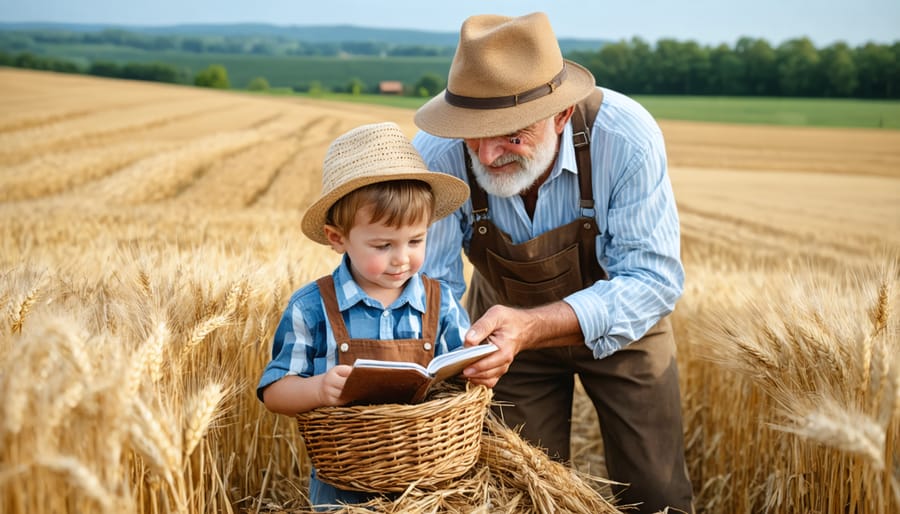
The Risk of Losing Generational Farming Knowledge
In Alberta’s farming communities, we’re witnessing a concerning trend as experienced farmers retire without fully passing on their wealth of agricultural knowledge. This invaluable expertise, built over generations of working the land, includes understanding local soil conditions, weather patterns, and tried-and-true farming techniques that have been refined through years of practice.
Recent surveys indicate that the average age of Canadian farmers is now 55, with many approaching retirement in the next decade. What’s particularly worrying is that only 8% of farms have formal succession plans in place. This gap threatens the preservation of crucial farming practices that have been proven effective in our unique Canadian climate and conditions.
Traditional knowledge, such as reading weather signs, managing livestock behaviour, and maintaining soil health through natural methods, often isn’t documented in farming manuals or taught in agricultural schools. These skills, passed down through hands-on experience and oral tradition, risk being lost if we don’t take active steps to preserve them.
Moreover, modern farming technologies, while valuable, work best when combined with traditional knowledge rather than replacing it entirely. Finding this balance is crucial for sustainable agriculture’s future.
Blending Old Wisdom with New Technology
Modern agriculture in Alberta is witnessing a remarkable fusion of time-tested wisdom and innovative technology. Third-generation farmer Mike Thompson from Lacombe County successfully combines his grandfather’s soil management techniques with digital farming skills, resulting in a 30% increase in crop yields. His approach involves teaching younger farmers traditional crop rotation principles while incorporating precision agriculture tools.
The Watershed Collective in Red Deer demonstrates another effective blend, where experienced farmers mentor newcomers in reading weather patterns and soil conditions while utilizing mobile apps for real-time moisture monitoring. This combination has helped participating farms reduce water usage by 25% while maintaining crop quality.
At the MacKenzie Farm near Edmonton, weekly knowledge-sharing sessions bring together farmers aged 20 to 70, creating a space where traditional seed selection wisdom meets modern genetic analysis tools. These sessions have become a model for other Alberta communities, showing how intergenerational collaboration can strengthen agricultural practices and build resilient farming operations.
Successful Intergenerational Training Models in Alberta
Mentorship Programs That Work
Several successful mentorship programs are currently transforming Alberta’s agricultural landscape, demonstrating the power of structured knowledge transfer between generations. The Young Agrarians Mentorship Program, for instance, has successfully paired over 100 emerging farmers with experienced mentors across Alberta, resulting in a 75% retention rate of new farmers in the industry.
The Alberta Farm Fresh School initiative stands out as another exemplary program, connecting retiring farmers with aspiring agriculturists through a structured 12-month curriculum. Participants meet monthly for hands-on training sessions, covering everything from soil management to business planning, while building lasting relationships that often extend beyond the program’s duration.
In central Alberta, the Heritage Seed Collective has developed a unique approach, combining traditional farming wisdom with modern sustainable practices. Their mentor-mentee pairs work together through a full growing season, with mentors sharing regional-specific knowledge about seed saving, crop rotation, and climate adaptation strategies.
The success of these programs hinges on clear expectations, structured learning objectives, and regular check-ins. Most effective initiatives include both formal training components and informal relationship-building opportunities, creating a comprehensive learning experience that benefits both mentors and mentees. Regular evaluation and feedback sessions ensure the programs remain relevant and effective for all participants.
Family Farm Succession Stories
The Thompson family farm in Red Deer County stands as a shining example of successful knowledge transfer across generations. Third-generation farmer Sarah Thompson worked alongside her father for five years before taking over their 800-hectare grain operation. “We created a structured mentorship program,” Sarah explains. “Dad would demonstrate techniques, then watch me perform them, offering feedback until I mastered each skill.”
In Manitoba, the Leblanc dairy farm implemented a unique approach to succession planning. Marcel Leblanc involved his daughter Marie in management decisions starting when she was just 16. Today, at 28, Marie manages their 200-head operation while Marcel serves as an advisor. “We documented everything,” Marcel shares. “From cattle breeding schedules to equipment maintenance routines. This gave Marie a reliable reference while building her confidence.”
The Chen family in southern Alberta demonstrates how traditional knowledge can blend with modern innovations. Their market garden operation successfully transitioned from parents to children by combining time-tested growing methods with new sustainable practices. “My parents taught me their techniques for timing plantings with local weather patterns,” says Michael Chen. “In return, I introduced them to precision agriculture tools that enhanced our efficiency.”
These success stories share common elements: structured knowledge transfer plans, documented procedures, and most importantly, patience and open communication. The families emphasized the importance of creating space for both generations to contribute their expertise while maintaining respect for different perspectives and approaches to farming.

Building Your Farm’s Knowledge Transfer Program
Creating Structured Learning Opportunities
Creating effective training programs requires careful planning and structure to ensure successful knowledge transfer between generations. Start by establishing clear learning objectives that align with both the experienced farmer’s expertise and the trainee’s development needs. For example, at the Henderson Family Farm in Olds, Alberta, they developed a seasonal training calendar that matches specific farming activities with learning opportunities.
Document your standard operating procedures (SOPs) for key farm operations, breaking down complex tasks into manageable steps. This creates a foundation for consistent training and allows learners to reference materials when needed. Consider creating visual aids, such as photos or videos of proper equipment operation, which can be especially helpful for hands-on learners.
Schedule regular training sessions during less busy periods of the farming calendar. Many Alberta farmers find success with weekly morning meetings that combine practical demonstrations with discussion time. Include both theoretical knowledge and hands-on practice, allowing trainees to observe, ask questions, and perform tasks under supervision.
Track progress through simple assessment tools, such as skills checklists or learning journals. This helps identify areas where additional support may be needed and celebrates achievements. Remember to adapt your training approach based on individual learning styles and pace. Some learners may grasp concepts quickly through observation, while others might need more hands-on practice time.
Always incorporate safety protocols and environmental best practices into your training program, ensuring that both traditional knowledge and modern sustainable farming methods are passed along to the next generation.
Documentation and Record-Keeping
Effective documentation is the cornerstone of preserving agricultural wisdom across generations. In Alberta, successful farms often maintain detailed records through both traditional and digital methods. Many farmers use a combination of field journals, photo documentation, and digital record-keeping systems to capture crucial information about crop rotations, soil management practices, and equipment maintenance procedures.
Creating a standardized documentation system helps ensure consistency and accessibility. Consider using a three-part approach: daily operational logs, seasonal planning documents, and long-term strategic records. These can include weather patterns, crop yields, pest management strategies, and innovative solutions to common challenges.
Digital tools have revolutionized agricultural record-keeping. Many Alberta farmers now use farm management software to track everything from soil testing results to equipment maintenance schedules. Video recordings of key farming operations, particularly unique or complex procedures, have become valuable training resources for the next generation.
Photos play a crucial role in documentation. Seasonal photographs of fields, crops, and infrastructure help track changes over time and provide visual references for future decision-making. Consider creating a digital archive organized by year and category for easy reference.
Establish regular documentation review sessions with family members or farm successors. Monthly or quarterly meetings to discuss and update records ensure that knowledge transfer remains active and engaging. Remember to include both successful practices and lessons learned from challenges, as these insights are equally valuable for future generations.

Technology Tools for Knowledge Sharing
In today’s digital age, effective knowledge sharing between generations relies heavily on accessible technology tools. Farmers across Alberta are increasingly embracing modern farm technology not just for operations, but also for training and mentorship.
Video conferencing platforms like Zoom and Microsoft Teams have become invaluable for connecting experienced farmers with the next generation, especially when distance is a factor. These tools enable real-time demonstrations and problem-solving sessions, with the added benefit of recording capabilities for future reference.
Mobile apps specifically designed for agriculture have revolutionized on-the-job training. Apps like AgriApp and FarmManager allow senior farmers to create detailed task lists, document standard operating procedures, and share crop management strategies with younger team members.
Cloud-based documentation systems have proven particularly effective for preserving generations of farming knowledge. These platforms enable the creation of digital handbooks, seasonal calendars, and equipment maintenance guides that can be easily updated and accessed from any device.
Social media groups and online forums have also emerged as powerful tools for intergenerational dialogue. Platforms like WhatsApp groups and Facebook communities allow farmers of all ages to share experiences, ask questions, and offer solutions in a collaborative environment.
For hands-on training, augmented reality (AR) applications are gaining traction, allowing experienced farmers to guide newcomers through complex tasks remotely while providing real-time visual instructions and feedback.
Measuring Success in Knowledge Transfer
Measuring the success of knowledge transfer between generations requires a comprehensive approach that combines both quantitative and qualitative metrics. Alberta farmers have found success using a multi-faceted evaluation system that tracks several key indicators throughout the training process.
One effective method is implementing regular skills assessments, where both mentor and mentee complete practical demonstrations of critical farming operations. These assessments can include equipment operation, crop management decisions, and livestock handling techniques. Documentation of these evaluations helps track progress and identifies areas needing additional focus.
Many successful agricultural education initiatives incorporate feedback loops, where participants regularly share their experiences and challenges. This two-way communication helps refine the training process and ensures both generations feel heard and valued.
Quantifiable metrics might include:
– Completion rates of planned training modules
– Number of successfully transferred responsibilities
– Reduction in operational errors or accidents
– Improvement in farm productivity metrics
– Financial performance indicators
Equally important are the qualitative measures:
– Confidence levels in decision-making
– Quality of communication between generations
– Knowledge retention and application
– Integration of traditional wisdom with modern techniques
– Team dynamics and workplace satisfaction
Regular check-ins, typically scheduled quarterly, help maintain momentum and allow for timely adjustments to the training approach. Many Alberta farmers have found success using digital tracking tools to monitor progress, though traditional written records remain valuable, especially for practical skills assessment.
Remember that success looks different for every farm operation. The key is establishing clear, measurable objectives at the outset and maintaining consistent evaluation throughout the knowledge transfer process. This ensures the training program remains aligned with both the farm’s succession goals and the learning needs of the next generation.
Intergenerational training represents a vital investment in the future of Canadian agriculture, offering a proven path to preserve and enhance our farming heritage. By implementing structured knowledge transfer programs, we can ensure that decades of valuable experience and wisdom aren’t lost between generations. The success stories from Alberta’s farming communities demonstrate that when we prioritize mentorship and collaborative learning, both experienced farmers and newcomers benefit from improved operational efficiency and innovation.
Take the first step today by initiating conversations about knowledge sharing within your farming operation. Whether you’re a seasoned farmer looking to pass on your expertise or a next-generation agriculturalist eager to learn, the time to act is now. Consider joining local farming associations, participating in mentorship programs, or creating your own structured training plan.
Remember, successful intergenerational training isn’t just about preserving traditional practices—it’s about building a bridge to the future of Canadian agriculture. By combining time-tested wisdom with fresh perspectives and new technologies, we can create more resilient and sustainable farming operations for generations to come. Your commitment to knowledge sharing today will help ensure a thriving agricultural sector tomorrow.

